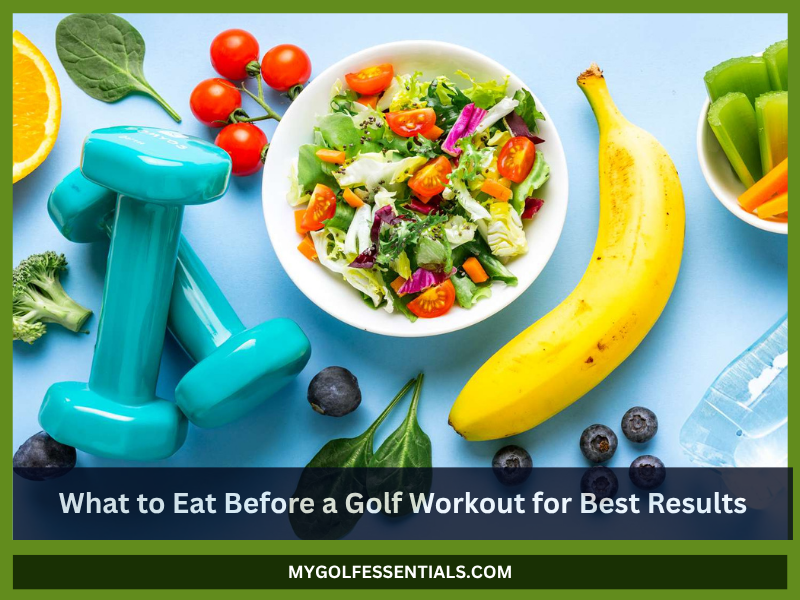
What should you eat before swinging your first club? If you’ve ever wondered what to eat before a golf workout, especially a golf workout, you’re not alone. Fueling your body the right way can make a big difference in how well you perform, how focused you feel, and how fast you recover.
And no, not all pre-workout foods are created equal, especially when it comes to a sport like golf that demands both stamina and precision.
In this article, we’ll break down exactly what golfers should eat before training to get the best results. You’ll learn the best foods to eat before a workout, when to eat them, quick snack ideas if you’re in a rush, and what to avoid.
Whether you’re hitting the gym or the driving range, this guide will help you pick the right fuel to boost your energy, sharpen your focus, and play your best.
Why Pre-Workout Nutrition Matters for Golfers
What you eat before a workout can directly impact how well you perform and that’s especially true for golf workouts. While golf may seem less physically demanding than contact sports, the level of control, focus, balance, and stamina it requires makes proper nutrition essential.
Without the right fuel, your energy may dip halfway through your training, affecting your swing, concentration, and posture.
Choosing the right pre workout food provides a steady energy release, helping you stay sharp and steady throughout your session. It prepares your muscles for movement, supports coordination, and prevents premature fatigue. For golfers looking to make progress with their swing, power, and consistency, eating right beforehand is just as important as practicing regularly.
How Proper Nutrition Enhances Performance and Recovery
The best food before workout sessions doesn’t just improve your performance, it also sets you up for faster recovery. Foods rich in complex carbohydrates and moderate protein allow your muscles to perform efficiently and repair afterward. In contrast, poor pre-workout nutrition can lead to muscle breakdown, slow recovery, and less productive practice sessions.
Benefits of eating the right food before a golf workout include:
- Sustained energy during long sessions
- Improved reaction time and coordination
- Faster recovery and reduced muscle soreness
Your fuel before exercise needs to be balanced and timed right, because even the healthiest food won’t help if it’s eaten at the wrong moment.
Common Mistakes to Avoid
Many golfers unknowingly sabotage their workouts by making simple nutrition mistakes. These include:
- Skipping meals entirely before training
- Eating too close to workout time
- Choosing foods high in fat or sugar
- Ignoring hydration
These mistakes can leave you feeling sluggish, uncomfortable, or distracted, limiting the effectiveness of your workout. Fortunately, they’re easy to avoid with a few smart timing habits, which we’ll cover in the next section.
Timing Your Pre-Workout Meals and Snacks
Knowing what to eat before a workout is only half the equation. The timing of your meals and snacks also plays a big role in how your body uses that fuel. Eat too early, and you might run out of energy. Eat too late, and you risk stomach cramps or sluggishness.
Optimal Meal Timing: 2–3 Hours Before Your Golf Workout
The ideal time for a full pre-workout meal is about two to three hours before your session. This gives your body time to digest the food and convert it into usable energy. A well-balanced meal at this time should include carbohydrates for energy, lean protein for muscle support, and a small amount of healthy fat.
Sample meal ideas:
- Grilled chicken with brown rice and vegetables
- Turkey sandwich on whole grain bread with fruit
- Oatmeal topped with nuts and berries
These meals give your body sustained fuel, help maintain blood sugar levels, and prevent hunger during your workout.
Ideal Snack Timing: 30–60 Minutes Before Exercising
If you don’t have time for a full meal, or your workout is scheduled soon, a light snack 30 to 60 minutes beforehand can give you a final boost of energy. Focus on easy-to-digest carbs and a little protein to avoid discomfort during movement.
Examples of quick, effective workout snacks:
- A banana with a tablespoon of peanut butter
- A small smoothie made with fruit and Greek yogurt
- A rice cake topped with honey or nut butter
These snacks are ideal for keeping energy levels steady without weighing you down.
Adjusting Food Intake Based on Workout Intensity
Not every golf workout is the same, so your fuel should match your effort level. For light sessions like putting or stretching, a small snack may be enough. But for high-intensity sessions, such as gym workouts or extended range time, you’ll benefit more from a full meal followed by a light snack closer to your workout.
Key Nutrients to Fuel Your Golf Workout
Whether you’re new to golf training or a seasoned player, what you eat before a workout should center around four key nutrients: carbohydrates, protein, healthy fats, and hydration. Each plays a specific role in fueling your body and helping it perform at its best.
Carbohydrates: Your Body’s Primary Fuel
Carbohydrates are the main source of energy for your muscles during workouts. They’re broken down into glucose, which powers your swing, movement, and stamina on the course or in the gym. Skipping carbs or not eating enough can result in fatigue, poor focus, and slower reactions.
Good sources of pre workout carbohydrates include:
- Brown rice or quinoa
- Whole grain bread or pasta
- Oats
- Sweet potatoes
- Fruit like bananas, apples, or berries
Vegan- and allergy-friendly tips: Gluten-free oats, rice-based pasta, or grain alternatives like buckwheat are excellent for those with gluten intolerance.
Protein: Repair and Muscle Support
Protein helps build and repair muscle tissue, which is especially important after strength-focused golf workouts. Including a moderate amount of protein before your session can also help prevent muscle breakdown.
Top protein options:
- Chicken breast or turkey
- Eggs or egg whites
- Greek yogurt or cottage cheese
- Plant-based: lentils, tofu, tempeh, or vegan protein shakes
Vegan and vegetarian tip: Combine plant proteins like beans and rice or hummus with whole grain pita to get a full amino acid profile. Allergy concerns? Choose seed-based proteins like hemp or chia if nut or soy allergies are a concern.
Healthy Fats: Sustained Energy
While fats shouldn’t be the star of your pre-workout meal, small amounts of healthy fats can offer longer-lasting energy, especially for extended practice sessions.
Healthy fat sources:
- Avocado
- Olive oil
- Nuts and nut butters
- Seeds (chia, flax, sunflower)
Alternative options: If you have nut allergies, opt for seed butters or avocado slices for a safe energy source.
Hydration: Don’t Forget to Drink
Staying hydrated is often overlooked, but it’s just as important as food. Dehydration can lead to early fatigue, reduced coordination, and slower decision-making on the course.
Tips for pre-workout hydration:
- Drink 16–20 oz of water 2–3 hours before your session
- Sip another 8 oz about 30 minutes before working out
- Consider adding electrolytes if your workout lasts longer than 60 minutes or if you sweat heavily
Best Foods to Eat 2–3 Hours Before a Golf Workout
Eating a well-rounded meal 2–3 hours before your golf workout gives your body enough time to digest and convert food into usable energy. The ideal meal should include complex carbohydrates, moderate protein, and a small amount of fat to keep you energized without feeling sluggish.
Balanced Meal Ideas
Here are some great meal options for different dietary needs:
Standard Options:
- Grilled chicken with brown rice and steamed vegetables
- Whole grain pasta with lean ground turkey and a side salad
- Turkey sandwich on whole wheat bread with an apple or orange
- Oatmeal topped with almonds and berries
Vegetarian-Friendly:
- Chickpea or lentil curry with quinoa and roasted vegetables
- Whole grain pasta with marinara sauce, tofu, and side of greens
- Veggie stir-fry with rice and scrambled eggs or paneer
- Greek yogurt with granola, banana slices, and sunflower seeds
Vegan Options:
- Tofu scramble with sweet potatoes and sautéed spinach
- Brown rice bowl with black beans, avocado, and grilled peppers
- Overnight oats with almond milk, chia seeds, and fruit
- Hummus wrap with veggies and a side of couscous
Allergy-Sensitive Alternatives:
- For dairy-free diets: use plant-based yogurts or lactose-free cheeses
- For gluten-free needs: choose quinoa, rice, or certified gluten-free grains
- For nut allergies: use sunflower or pumpkin seeds instead of nuts
Mix and match these based on what you enjoy, your energy needs, and your dietary restrictions. The key is to find a combination that gives you steady energy and leaves you feeling light, not weighed down.
But what if you don’t have a full 2–3 hours before you hit the range or gym? Up next, we’ll look at the best snacks to eat 30–60 minutes before a golf workout, quick, light, and effective.
Quick and Easy Snacks 30–60 Minutes Before Exercising
Sometimes you don’t have the luxury of a full meal a few hours before your workout. That’s where quick and easy snacks come in. If you’re wondering what to eat before a workout when you’re short on time, these light options can give you the energy you need—without feeling too full or sluggish.
The goal here is to focus on simple carbs and a bit of protein, with minimal fat and fiber to speed up digestion.
Smart Snack Ideas
Standard Options:
- Banana with a tablespoon of peanut butter
- Greek yogurt with a drizzle of honey and sliced almonds
- Whole grain toast with jam or honey
- A fruit smoothie made with low-fat milk and protein powder
Vegetarian and Vegan Alternatives:
- Banana with sunflower seed butter (nut-free and vegan)
- Dairy-free yogurt with maple syrup and chia seeds
- Rice cake with fruit spread
- Smoothie made with plant-based milk and vegan protein powder
Allergy-Friendly Substitutes:
- Use oat or coconut-based yogurt for dairy allergies
- Choose seed butters instead of peanut or almond butter
- Go for gluten-free toast if needed
Keep these snacks small and easy to digest. You’re not aiming for a full stomach, just enough fuel to get through your golf workout. Up next, though, we’ll talk about the other side of nutrition: what not to eat before hitting the gym or course.
Foods to Avoid Before Your Golf Workout
Knowing what to eat before a workout is crucial but knowing what to avoid is just as important. Eating the wrong foods too close to your golf session can cause discomfort, sluggishness, or sudden drops in energy.
Steer Clear of These Foods:
- High-fat and fried foods: Think burgers, fries, or heavy sauces. These take longer to digest and can leave you feeling tired or bloated.
- High-fiber foods: While fiber is great for overall health, eating too much right before a workout (like beans or raw broccoli) can lead to gas, cramping, or digestive upset.
- Sugary snacks and drinks: Candy bars, energy drinks, or sugary pastries may give you a quick spike but they’re often followed by a crash that kills your focus and stamina.
- Carbonated drinks: Sodas and fizzy waters can cause bloating, which is the last thing you want while practicing your swing.
Sample Pre-Workout Meal Plans for Golfers
When deciding what to eat before a workout, it helps to have go-to meals that are easy to prepare and fit your schedule. Whether you’re training in the morning, afternoon, or evening, the goal remains the same: fuel your body with balanced nutrition. These sample meal plans are designed for different times of day, with options that suit a variety of dietary needs.
For morning workouts, your body needs a light but energy-rich meal that won’t weigh you down. Oatmeal with banana and a boiled egg is a solid choice. The oats provide slow-releasing carbohydrates, while the egg adds protein to keep you satisfied.
If you’re vegetarian, try oatmeal with almond butter and sliced fruit. For a vegan alternative, use plant-based milk and top your oatmeal with chia seeds and berries. Those with allergies can opt for gluten-free oats and use sunflower seed butter instead of nut-based spreads.
In the afternoon, a more substantial meal will give you the energy needed for a strong performance. A grilled chicken sandwich on whole grain bread with fruit offers carbs, lean protein, and natural sugars.
Vegetarians can swap the chicken for egg salad, and vegans might go for a hummus and veggie wrap. If you’re avoiding gluten, use gluten-free bread or wraps.
Evening workouts can be fueled by a dinner-style meal. A bowl of brown rice with steamed vegetables and tofu or grilled fish is a great base.
Here are some variations to suit different diets:
- Vegetarian: Brown rice with stir-fried tofu and broccoli
- Vegan: Quinoa bowl with black beans, roasted vegetables, and avocado
- Allergy-friendly: Use lentils or chickpeas instead of tofu if allergic to soy
Meal timing and portion sizes can be adjusted based on personal preference and how long you have before your workout begins.
Final Tips for Optimal Pre-Workout Nutrition
Eating the right foods is only one piece of the puzzle. To get the best results from your golf workouts, it’s important to focus on consistency, listen to your body, and stay properly hydrated.
Start by paying attention to how your body reacts to different foods and meal timings. Some people may perform better with a larger meal 2–3 hours beforehand, while others do fine with a light snack 45 minutes before. The key is learning what works best for you through a bit of trial and error.
Next, aim to keep your routine consistent. Eating at roughly the same times before each session helps regulate your energy levels and digestion. Over time, your body will adapt and perform more efficiently.
Don’t forget about hydration. Drinking water throughout the day, not just right before exercise, ensures that you’re properly fueled and alert, especially during longer or outdoor sessions.
To wrap things up, here are a few quick reminders:
- Adjust portion sizes based on how your body feels
- Stick with foods that you digest easily and enjoy
- Avoid last-minute food experiments before training
- Keep a water bottle nearby and sip often
Conclusion
Knowing what to eat before a workout can make a big difference in how you perform, especially when it comes to golf, where both strength and focus matter. Whether you’re gearing up for an intense training session or a light practice round, the right pre-workout food helps you stay energized, recover faster, and avoid mid-round fatigue.
From full meals to quick snacks, and whether you’re a meat-eater, vegetarian, vegan, or managing food allergies, there’s a fueling strategy that fits your needs. Focus on timing, balance your nutrients, and stay consistent. With the right approach, your body will have everything it needs to deliver results on the course.
Ready to level up your game? Start with what’s on your plate, your next best round might begin in the kitchen.
Key Points
- Pre-workout nutrition is essential for boosting energy, focus, and performance during a golf workout.
- Eating the right food before a workout enhances both physical performance and recovery.
- Skipping meals or choosing the wrong foods before exercising can negatively affect your golf performance.
- The ideal time for a full pre-workout meal is 2–3 hours before your workout.
- A light snack should be consumed 30–60 minutes before exercising for an extra energy boost.
- Your food choices should depend on workout timing, intensity, and personal digestion.
- Carbohydrates, protein, healthy fats, and hydration are key nutrients to support your golf workout.
- Balanced meals like oatmeal, grilled chicken with rice, or tofu and vegetables are great options 2–3 hours before training.
- Quick snacks like bananas with nut butter or smoothies are effective right before a workout.
- Consistency, hydration, and listening to your body are crucial for maintaining an effective pre-workout nutrition routine.
FAQs
Are there specific foods that can enhance my golf performance?
Foods rich in complex carbohydrates and lean proteins, such as oatmeal with berries, grilled chicken with brown rice, or a turkey sandwich on whole grain bread, can provide sustained energy and support muscle function during your golf workout.
Can I have coffee before my workout?
Moderate caffeine intake, such as a cup of coffee, can enhance alertness and performance. However, it’s important to stay hydrated and ensure that caffeine doesn’t cause any adverse effects like jitteriness or increased heart rate during your workout.
What foods should I avoid before a workout?
It’s best to avoid high-fat and fried foods, high-fiber foods, and sugary snacks before a workout, as they can cause sluggishness, digestive discomfort, or energy crashes during exercise.



